Joint effects 2011 - An update of the involvement - 18 Weeks
Joint effects 2011 - An update of the involvement - 18 Weeks
Joint effects 2011 - An update of the involvement - 18 Weeks
You also want an ePaper? Increase the reach of your titles
YUMPU automatically turns print PDFs into web optimized ePapers that Google loves.
<strong>Joint</strong> <strong>effects</strong> <strong>2011</strong><br />
The National Musculoskeletal Redesign Programme<br />
2010 – 2013: Allied Health Pr<strong>of</strong>essional <strong>involvement</strong><br />
The need for redesign was signalled within <strong>the</strong> Delivery framework for adult<br />
rehabilitation published in 2007. The framework identified that considerable<br />
improvements could be made for patients in both <strong>the</strong>ir outcome and experience <strong>of</strong><br />
Scotland’s MSK services. In particular by:<br />
●●<br />
improving access to services<br />
●●<br />
providing consistent and high quality information about <strong>the</strong>ir condition<br />
as early as possible<br />
●●<br />
providing information and advice to support self-management<br />
●●<br />
shortening waiting times<br />
●●<br />
adopting evidence-based treatment plans<br />
●●<br />
enabling people to stay in or return to work<br />
●●<br />
ensuring an equal, high quality <strong>of</strong> care across Scotland<br />
●●<br />
achieving sustainability and efficiencies to reinvest in better MSK services.<br />
There are three key work areas:<br />
1 Multi-pr<strong>of</strong>essional MSK care pathways<br />
2 A pilot using NHS 24 telephony to provide a National Advice and Triage Service to<br />
signpost to information and local MSK services.<br />
3 Embedding Working Health Services Scotland in all MSK pathways<br />
Multi-pr<strong>of</strong>essional MSK care pathways<br />
AHPs within health boards across Scotland are working as part <strong>of</strong> multidisciplinary<br />
teams, developing and introducing a range <strong>of</strong> MSK care pathways.<br />
This MSK scoping exercise demonstrates a lot <strong>of</strong> ‘pathway activity’. More is planned.<br />
Business redesign approaches are being used to modernise services and ensure<br />
patients have access to high quality, consistent information about <strong>the</strong>ir condition as<br />
soon as possible.<br />
Pathfinder Boards have focused on pathways that are based around <strong>the</strong> highest<br />
patient activity, i.e. low back pain, hip and knee problems. They have adopted a<br />
multidisciplinary approach and take a ‘patient-eye view’ <strong>of</strong> <strong>the</strong> existing service on<br />
<strong>of</strong>fer, asking <strong>the</strong> question “why” at each step <strong>of</strong> <strong>the</strong> patient journey.<br />
The aim is to reduce duplication and take steps out, so people can access <strong>the</strong> most<br />
appropriate healthcare option quickly, easily and safely.<br />
There are many more AHPs practicing in new ways, e.g. referring patients for, and<br />
acting on, diagnostic tests, prescribing medication and undertaking injections avoiding<br />
<strong>the</strong> need for ano<strong>the</strong>r GP referral. The MSK pathway programme is being supported<br />
by dedicated project management support with training for new roles and advanced<br />
practice provided through NHS Education for Scotland (NES).<br />
The National Advice and Triage Service<br />
NHS 24 is leading on <strong>the</strong> development <strong>of</strong> <strong>the</strong> national point <strong>of</strong> access to MSK services<br />
using <strong>the</strong>ir established telephony platform. The NHS 24 pilot will go live in two early<br />
adopter sites between December and January. The project will be evaluated and is due<br />
to report in early Summer 2012.<br />
The service will operate Monday to Friday, 9.00 am to 8.00 pm. Patients and those<br />
wanting access to advice and information will be encouraged to call a national<br />
number. The first person a caller will talk to will be a call operator. They will be taken<br />
through a series <strong>of</strong> questions about <strong>the</strong>ir MSK problem, covering demographic details,<br />
key safety and problem-specific questions, risk indicators and employment. Call<br />
operators follow protocols developed by MSK experts, have extensive training and<br />
clinical supervision on hand at all times.<br />
The protocol has been developed and endorsed by a national expert panel including<br />
service users and is based on <strong>the</strong> NHS 24 operating model where patient safety<br />
8<br />
mskscoping<strong>2011</strong>-rs.indd 8 03/11/<strong>2011</strong> 11:01


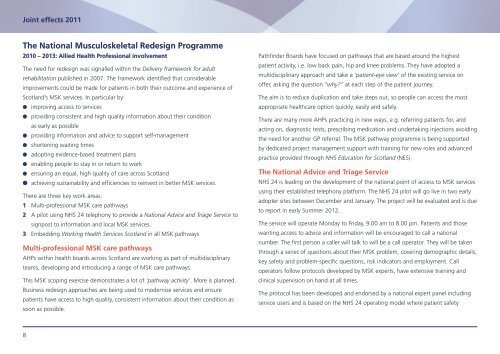
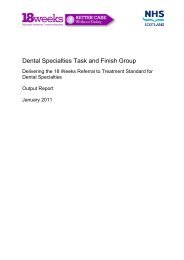
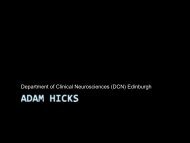
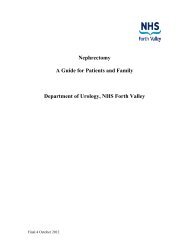
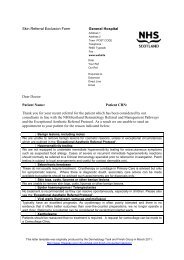
![Dr Matthew Checketts, NHS Tayside [PDF - 6Mb] - 18 Weeks](https://img.yumpu.com/49027155/1/190x143/dr-matthew-checketts-nhs-tayside-pdf-6mb-18-weeks.jpg?quality=85)
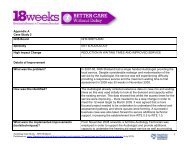
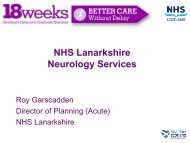
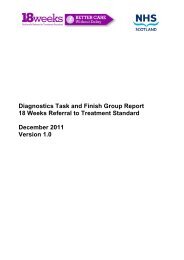
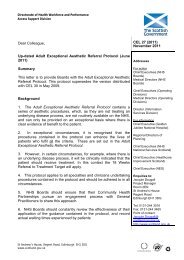
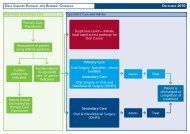
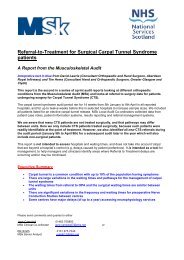
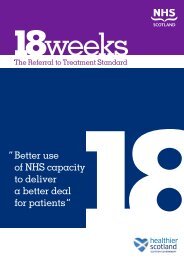
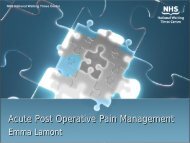
![Mark Sindall, NHS Dumfries and Galloway [PDF - 227Kb] - 18 Weeks](https://img.yumpu.com/30080335/1/190x143/mark-sindall-nhs-dumfries-and-galloway-pdf-227kb-18-weeks.jpg?quality=85)